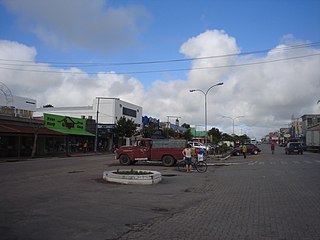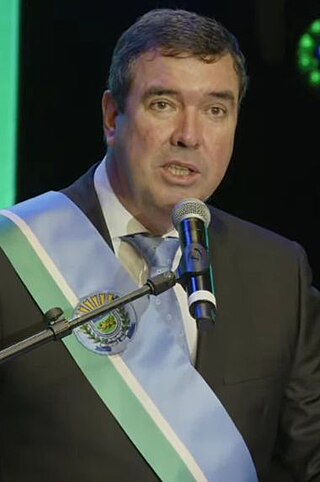
Campo Grande is the capital and largest city of the Brazilian state of Mato Grosso do Sul in the Center-West region of the country. The city is nicknamed Cidade Morena because of the reddish-brown colour of the region's soil. It has a population of 906,092, according to a 2020 IBGE estimate,.

Chuí is a municipality located in the state of Rio Grande do Sul, Brazil. It's the southernmost municipality of Brazil, located in the coordinates 33°41′0″S. A border town, it shares its name with sister city Chuy, Uruguay. The two towns constitute one contiguous urban area, divided by a border street called Avenida Internacional, a situation also seen in a few other Brazilian border points, such as between Santana do Livramento (Brazil) and Rivera (Uruguay).
Regional Electoral Court is a level of the electoral court system in Brazil. The regional courts are in charge of elections at the state level.

Cerrito is a Brazilian municipality in the southern part of the state of Rio Grande do Sul. The population is 6,047 in an area of 451.70 km2. The municipality was formed in 1997 from part of the municipality Pedro Osório.

Arroio do Padre is a Brazilian municipality in the southeastern part of the state of Rio Grande do Sul. Its 2020 population was 2,951.

The Brazilian Election Justice was created by Decree No. 21,076 of 24 February 1932, representing one of the innovations of the Brazilian Revolution of 1930. In 1932 there was the first edited Brazilian Election Code, inspired by the Election Justice of the Czech Republic and the ideas of Joaquim Francisco de Assis Brasil, a politician, farmer and ambassador
The Brazilian municipal elections of 2012 took place on October 7 and on October 28. Over 138 million voters chose mayors, deputy mayors and city councillors for the 5,568 municipalities of Brazil. These were the first elections in which the recently registered parties Partido Pátria Livre (PPL) and Partido Social Democrático (PSD) participated; they were both recognized by the Superior Electoral Court in 2011. Political parties whose candidates wished to run for the 2012 elections had to be registered at the TSE for at least one year before the election date, while candidates also had to be affiliated to a party for the same period of time. Conventions for the selection of candidates within the parties occurred between 10 and 30 June, while the registry of candidates and alliances with the Regional Electoral Courts took place until July 5. Electoral campaign was authorized from the moment a candidacy had been registered. The free electoral program – two daily slots on free-to-air TV and radio for political advertising paid by the Electoral Justice fund – ran weekdays from 21 August until 4 October. According to the current Brazilian electoral law, the two-round system – should the leading candidate receive less than 50% +1 of the votes – is only available for cities with more than 200,000 voters. This includes all state capitals, with the exception of Boa Vista, Roraima and Palmas, Tocantins, plus 59 other municipalities. The free electoral program for the second round ran from 13 October until 26 October.

Events in the year 1965 in Brazil.

Reinaldo Azambuja Silva is a Brazilian agriculturalist and politician, affiliated with the Brazilian Social Democracy Party, was Governor of Mato Grosso do Sul from January 1, 2015 to January 1, 2023. Azambuja replaced André Puccinelli in 2014, and was replaced by Eduardo Riedel in 2023. In elections in Mato Grosso do Sul in 2014 he ran for governor. Azambuja came in second place in the first round and won the election in the second round against the candidate Delcídio Amaral.

Soraya Vieira Thronicke is a Brazilian politician and lawyer. She has spent her political career representing Mato Grosso do Sul, having served as senator for that State since 2019.

Orleir Messias Camel was a Brazilian politician and businessman who held the office Governor of Acre from 1995 to 1999.
The 2010 Brazilian general election saw Dilma Rousseff of the Workers' Party (PT) elected president.
The 2022 Rio Grande do Sul state election took place in the state of Rio Grande do Sul, Brazil on 2 October 2022. Voters elected a Governor, Vice Governor, one Senator, 31 representatives for the Chamber of Deputies and 55 Legislative Assembly members, with a possible second round to be held on 30 October 2022. Former governor Eduardo Leite, was eligible for a second term and announced that he's running for reelection.

The Governor of Mato Grosso do Sul is the head of government of the Brazilian state of Mato Grosso do Sul. It is a public position chosen through the two-round majority electoral system. If a candidate receives more than 50% of the total votes in the first ballot, he is elected without the need for a second round. But if no candidate obtains an absolute majority, a second round of voting would take place, where only the two candidates who obtained the most votes in the first round would participate. The winner of the second round would be elected governor. The legislature lasts 4 years and the governor has the right to re-election, without term limits.

Eduardo Corrêa Riedel is a Brazilian politician and businessman who has served as Governor of Mato Grosso do Sul since January 1, 2023. Already held the position of Secretary of State for Infrastructure of Mato Grosso do Sul from February 22, 2022 to April 2, 2022.

Rosiane Modesto de Oliveira is a Brazilian politician and teacher, is currently serving her first term as a federal deputy of Mato Grosso do Sul, she was previously Vice Governor of Mato Grosso do Sul from January 2015 to January 2019 in the government of Reinaldo Azambuja. It was between January 2015 and April 2016 Secretary of Human Rights, Social Assistance and Labor of Mato Grosso do Sul during the government of Reinaldo Azambuja.

José Orcírio Miranda dos Santos, better known as Zeca do PT, is a Brazilian banker and politician, affiliated with the Workers' Party (PT). Elected State Deputy of Mato Grosso do Sul by the Workers' Party in 2022. He is a former federal deputy, being a former state deputy and former governor of Mato Grosso do Sul for two terms.


















